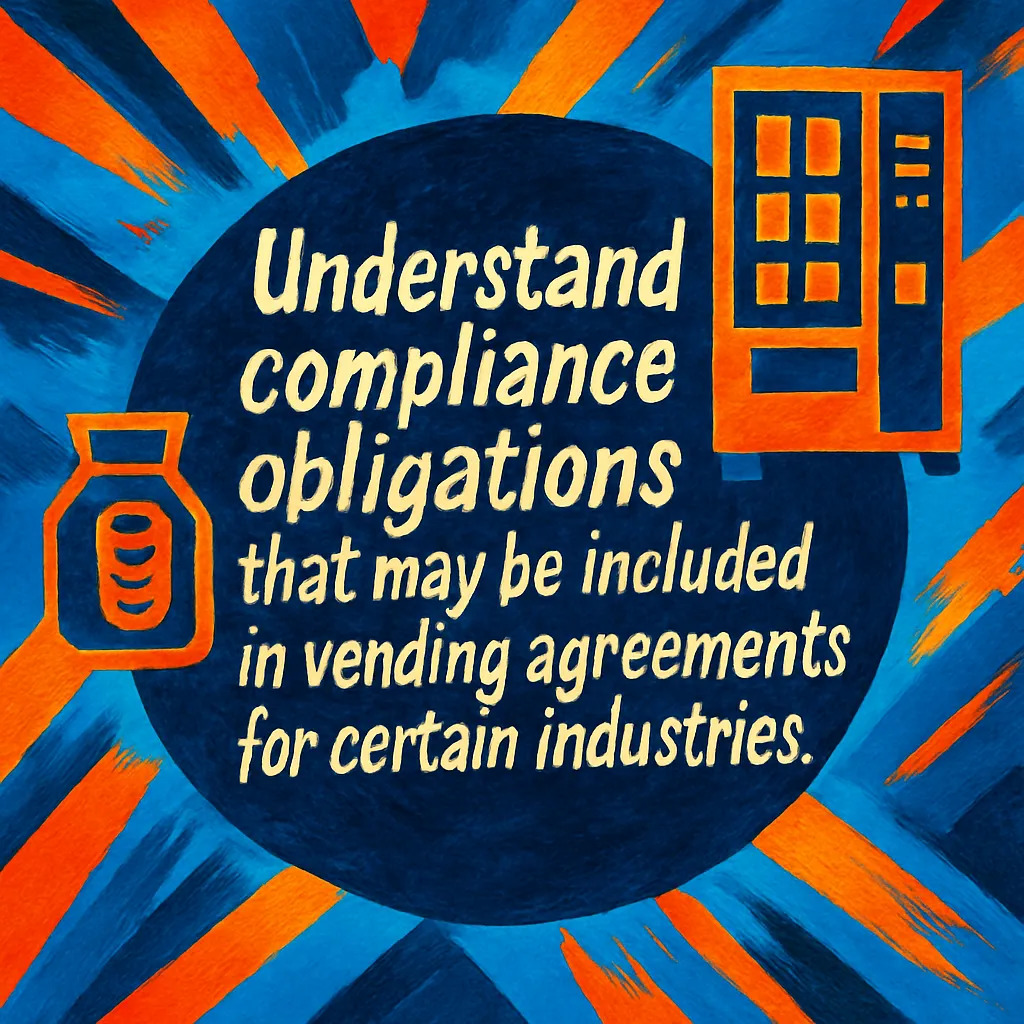Compliance Requirements in Vending Contracts
Understand compliance obligations that may be included in vending agreements for certain industries.
Back to Vending Contracts ResourcesUnderstand compliance obligations that may be included in vending agreements for certain industries.
Back to Vending Contracts ResourcesVending contracts are not just about machines and products; they often contain critical compliance requirements that must be understood and adhered to by both parties ensuring legal operation and consumer safety.
![]() Ensure contracts meet local, state, and federal regulations
Ensure contracts meet local, state, and federal regulations
![]() Address product safety, labeling, and accessibility standards
Address product safety, labeling, and accessibility standards
![]() Define responsibilities for maintaining compliance
Define responsibilities for maintaining compliance

Vending contracts, while seemingly straightforward, can be complex documents laden with critical compliance requirements. These stipulations are designed to protect consumers, uphold public health, and ensure legal operation, making them a cornerstone of any vending agreement. Understanding these nuances is vital for both businesses hosting machines and the vending operators.
Compliance in vending contracts typically spans several key areas. Foremost among these are health and safety standards. This includes requirements for proper temperature control for perishable items, sanitary handling of products, and machine cleanliness. Product labeling, such as nutritional information and allergen warnings, is also a common requirement, especially with increasing consumer awareness and regulatory scrutiny. For detailed insights into contract terms, exploring common clauses in vending contracts can be beneficial.
Accessibility is another crucial compliance aspect. The Americans with Disabilities Act (ADA) often mandates that vending machines be accessible to individuals with disabilities, covering aspects like machine height, payment system access, and clear pathways. Furthermore, environmental regulations might necessitate energy-efficient machines or dictate waste management practices, such as recycling programs around vending units.
The nature of compliance requirements can vary dramatically based on the industry and location where the vending machines are placed. For instance, vending machines located in schools must adhere to strict nutritional guidelines, such as the USDA Smart Snacks in School standards. Healthy snack policies for schools are integral and must be clearly outlined in contracts.
Similarly, healthcare facilities may have additional mandates concerning hygiene, restricted product lists, or even specialized vending for personal protective equipment (PPE). Public buildings, like government offices and courthouses, often have policies regarding product offerings, revenue sharing, and accessibility in public building vending. A thorough understanding of these varying environmental factors is an integral part of negotiating vending contracts.
A well-drafted vending contract explicitly defines who is responsible for ensuring compliance. Typically, the vending operator bears the primary responsibility for the products, machine maintenance, and adherence to specific operational standards. However, the location host is often responsible for providing a compliant environment, including proper electrical hookups, adequate space, and safe access for servicing. Clearly written service level agreements explained are essential to outline these duties.
Failure to meet compliance requirements can lead to significant repercussions, including fines, penalties, negative publicity, and contract termination. Therefore, both parties must engage in due diligence, ensuring all applicable regulations are identified, documented, and regularly reviewed. Reviewing common clauses in vending contracts can provide further clarity on legal expectations.
Ultimately, robust compliance within vending contracts not only safeguards against legal and financial pitfalls but also builds trust and enhances the user experience. It ensures that vending services operate smoothly, ethically, and in line with evolving societal expectations.
Common requirements include health and safety standards, product labeling regulations, ADA accessibility, and sometimes specific nutritional guidelines, especially in certain venues like schools or healthcare facilities.
Compliance helps ensure legal operation, protects consumers, maintains public health standards, and mitigates risks for both the location host and the vending operator.
No, compliance clauses can vary significantly depending on the industry, location type (e.g., government building, school, hospital), and local, state, or federal regulations specific to that environment.
Healthy vending standards often specify limits on calories, fat, sugar, and sodium content in products. Examples include USDA Smart Snacks in Schools or state-specific public health initiatives.
ADA compliance typically requires machines to be at certain heights, have accessible payment options, and clear pathways for wheelchair users to operate them, ensuring vending is available to all patrons.
Responsibility is often shared or explicitly defined in the contract. The vending operator is usually responsible for product contents and machine standards, while the location host ensures proper placement and facility access.
Yes, some contracts, particularly in corporate or brand-sensitive environments, may include clauses about product sourcing (e.g., local, organic) or require specific brand inclusions or exclusions.
Non-compliance can lead to a range of issues, from fines and penalties to contract termination or reputational damage for both parties involved.
Increasingly, contracts may include environmental clauses regarding energy-efficient machines, waste management (recycling), and responsible product packaging, especially in sustainability-focused organizations.
It is crucial to thoroughly review the contract terms, understand all applicable laws and regulations for your specific location type, and communicate openly with the vending operator to ensure all standards are met.